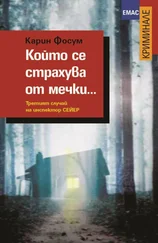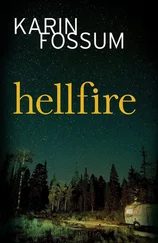The piece of paper was the same as the last one, folded double, the letters just as big and straight.
‘IT’S NOT LONG NOW.’
She stood there without moving for a long time, deeply regretting that she had been foolish enough to read the message. She crushed it into a hard paper ball, so it would burn better. Then she trudged up to the house, let herself in. She threw the letter in the burner, lit a match, held it to the paper and closed the heavy door. Watched the flames through the glass. The fire devoured the paper ball with impressive speed. Wonderful, she thought. She had quite simply cremated him and all that he stood for. Nothing could annihilate like fire could. She put two big logs into the burner as though to make a statement, and stayed there on her knees until they started to burn too.
It was perhaps something she should report to the police, she thought later, when she had finally sunk down into her favourite armchair. But she had destroyed both letters, she realised, so she had nothing to show. And they were not likely to do anything anyway, it was autumn, and dark, and people were roaming the streets with all their issues and anger. Women were being beaten up and abused by their husbands, children were being neglected, the powers that be had enough on their plates. And this person had not laid a hand on her. And anyway, she told herself, I’ve never been the hysterical type. I’m not the sort of person to waste valuable resources on this kind of nonsense, it’s below me. She put the dishwasher on, and tried to settle down in front of the television, but was overcome with regret that she had burned the letters. There would be a letter number three, she was certain of that, and she would definitely keep that one. Number three, and four and five. And what then? Where would it end? Should she perhaps inform everyone close to her that some madman was after her? What if he was one of the people in her small circle? What did he actually want? Her fear, her life? Better instead to curl up in a corner, turn up the volume on the television, close the curtains and not let so much as a strip of light in.
She went out into the hall to check that she had locked the door and that the security chain was on, even though the chain itself was so thin it could easily be cut with pliers. Sometimes if the doorbell rang in the evening, she did not dare to answer. Depending on how late it was, and this had changed over the years. When she was younger, she would open the door until ten, but now she became anxious if it was after eight, certainly in the autumn, when it was dark. Anyone who came by car usually parked by the roadside and walked up to the house. It was not easy to gauge if there was enough room to turn in the driveway, especially in winter. And when it came to clearing the snow, she was useless, a shovel full of wet snow weighed too much for her. She had never owned a car, so she trampled a narrow path down to the road, and tried to clear around the rubbish bin and mailbox as best she could. Sometimes Olaf took pity on her and would take a few turns on his Honda snowblower. But so far, there had been no snow, just darkness, and the lonely street lamp at the end of her drive. Every time she passed it, she noted the wear and tear. Sooner or later it would come down, but not in her time, she hoped, even though she could see that it leaned more and more for each year that passed.
She stood by the window. There were Olaf and Dolly going for a walk in their high-viz jackets. She noticed that he glanced up at her house, and she appreciated that. It meant he thought about her, that she was part of his universe, just as he and Dolly were a part of hers. He continued on to the Teigens’ house where the removal men were still busy. Maybe he wanted to say goodbye and wish them well, which was something she had not even thought about, just as she would never contemplate going over to the house to welcome the new family when they moved in. But of course Olaf did, because he was nosy. Oh, I’m being mean now, she thought, there’s nothing wrong with wanting to know the neighbours, I’m just a coward. Arrogant and uninterested. She sat down again and thought about the empty rooms in the Teigens’ house. How cold it would be when everything had been loaded into the removal van, how dusty and faded. The walls full of holes and the ceiling lamps giving off a garish light — perhaps the glass covers were full of dead flies, her own were. She could not imagine anything as wretched as an empty house. The walls would have their secrets. Daylight would flood in through the bare windows and reveal all the wear and tear, all the footsteps across the floors, all the doors that had been opened and closed, sometimes with great force. Worn thresholds, discoloured bathroom porcelain that could no longer be bleached clean, the odd mirror on the wall stained brown by the years. If anything of beauty had existed between the walls, it would not be visible. Only the decay would be visible, the damage, the bad days. A bit like an old skeleton, Ragna thought, which had even more to tell about a life once lived than an empty house. Man or woman, young or old, ill or injured. Lifestyle, diet. I want to be buried when I die, like Mummy and Daddy. My skeleton will lie there with all its bumps and wounds. And in theory, it would be possible to dig up the skeleton and re-examine it. The bones would be the proof that she had once lived and she wanted there to be proof. The alternative, the burning heat, meant total annihilation.
I will never move, Ragna determined. She looked at everything around her, the pictures, the furniture and rugs, the cushions on the sofa, carefully plumped and positioned in the same way every day, and the cosy, folded blanket. The large photograph of her parents from a time when they were Hans and Signe and did not know what the future held. At the point the picture was taken, they knew nothing about Ragna, because she did not exist anywhere, she was just a possibility they had chosen to explore, and, she believed, had not regretted. Nor did they know anything about Rikard Josef at that point. She was filled with melancholy when she looked at the picture of her parents. It really was possible to be that happy for a few brief, innocent moments. She had looked after the house, and it had not fallen into the hands of strangers. She could see that it was tired, but it was old after all. Her parents had never redecorated, they did not have the means, and she had only replaced the furniture and a few other things. But it was just her, padding quietly around — no one else really came to the house. Only Gunnhild, who had popped by a couple of times when she was ill. That’s how small my world is, Ragna reflected. Some travel to the other side of the world to meet new people, others make new bonds by arranging parties where they make a lot of noise, laugh, raise their glasses and spill their secrets. These thoughts made her look down at her body. She had taken the baggy green shop coat off and hung it on the back of a chair, but she was still wearing the sweater that almost reached her knees. It was machine-knitted from synthetic wool and had gone bobbly after several washes, even though she had done it on a delicate cycle. She wondered what Rikard Josef had thought when he received the letter, in an unexpected move so long before Christmas. Did he see it as a plea for contact or an accusation? Would he give something himself as a result? What if Hotel Dormero was doing badly and he was forced to find another job, would he let her know? She assumed not. If he had had a knock, he might feel ashamed and keep her at a distance. In the way that she was ashamed of the knock she had taken. Someone had sentenced her to death.
‘IT’S NOT LONG NOW.’
She had thick red curtains in front of the bedroom window that went all the way to the floor. There were lead weights in the hem so that they would fall properly and look good. When she went to bed in the evening, she opened the window — be it summer or winter, she had to have fresh air. It made no difference if it was freezing cold. She liked to lie under the duvet and listen to the world outside, feel the cool air breezing in. Sometimes, in autumn, wild storms made the small cluster of trees round the back of the house into an attacker, as the wind hurled cones and branches at the wall. She often hoped for a storm. She liked it when nature showed its strength, because she found the thought that people were the only controlling force too alarming. If the sun wanted to burn out, if the ocean wanted to flood the land and drown everything there, down to the smallest beast, that was fine. She would bow to that, bow with humility. Her bed was right under the window. On occasion, she had even felt the rain on her face. Some mornings she found dry leaves on the floor that had blown into the room, and in winter, she had even woken to tiny snow drifts against the skirting. Then she would make a snowball, drop it into the toilet, and stand there watching it melt.
Читать дальше












